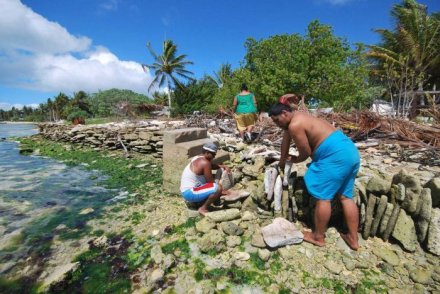
AUCKLAND (Pacific Media Watch): The story about the i-Kiribati man seeking climate asylum in New Zealand has made headlines in news media around the world.
Last week, a man from Kiribati, Ioane Teitiota, asked New Zealand’s High Court in Auckland to let him appeal a decision that refused him asylum on the grounds his claim fell short of the legal criteria, such as fear of persecution or threats to his life.
Teitiota, who came to New Zealand in 2007 and has three children born here, said he and his family would suffer serious harm if forced to return to Kiribati, because there was no land to which he could safely return, ONE News reported.
The lawyer of the i-Kiribati man said his client was being "persecuted passively by the circumstances in which he's living, which the Kiribati Government has no ability to ameliorate".
If the High Court rules in favour of Teitiota, he would become the world’s first climate refugee and create a wholly new class of refugees, according to France 24.
A decision in the case is expected in “the coming weeks”, BBC News reported.
Media coverage
The developments in the Auckland High Court has interested news media from all over the world.
A Google search quickly revealed that several renowned international news media outlets, ranging from the US, UK and Australasia to India, the Middle East and continental Europe, had covered the case in the last few days.
BBC News, Al Jazeera, The Times of India, The Washington Times, the US online news website Slate.com, France 24, The Huffington Post, The Telegraph, Radio Australia, The Wall Street Journal, The Guardian, Reuters, AP and AFP were only a few of the news media covering the story.
In a commentary article, The Times of India called the story “curious” and argued international justice could only be served by recognising the category of climate refugees.
Other news media, however, quoted legal experts saying the likelihood of Teitiota’s claim being granted is very small.
"The definition in Article 1A(2) [of the Refugee Convention] has to do with a well-founded fear of persecution on the grounds of race, ethnic origin, nationality, religion, gender and so on," Associate Professor of Law at the University of Auckland Bill Hodges told Radio Australia.
"I'm afraid - and I'm trying to be sympathetic and humanitarian here - but the definition in the convention does not apply to a person who is effectively a climate refugee or an economic refugee because of climactic reasons.
"So I think he's got a big uphill battle here - I don't think he will be successful."
‘Basic human rights’
Teitiota’s lawyer was of a different viewpoint.
“Fresh water is a basic human right...the Kiribati Government is unable, and perhaps unwilling, to guarantee these things because it’s completely beyond its control,” Kidd said.
"The Refugee Convention which came into effect at the end of the Second World War needs to be changed, to incorporate people who are fleeing climate catastrophe, and what's happening to Kiribati in the next 30 years is a catastrophe," he told Radio New Zealand.
He said Teitiota’s case had the potential to set an international precedent, not only for Kiribati’s 100,000 residents but for all populations threatened by man-made climate change.
Except for the island of Banaba, Kiribati consists solely of low-lying atolls prone to sea-level rise caused by anthropogenic climate change.
Last month, leading climate change scientists said in a report they were now 95 per cent certain human activity was the main cause of climate change and warned that the world was set to experience more heat waves, floods, droughts and rising sea levels that could swamp coasts and low-lying islands as greenhouse gases build up in the Earth’s atmosphere.
This work is licensed under a Creative Commons Attribution-NonCommercial 3.0 New Zealand Licence.




